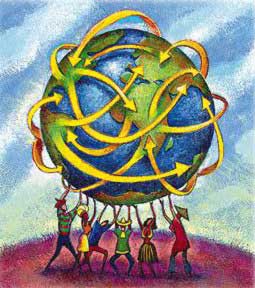The Economics of Mass Immigration
October 27, 2016

M. OLIVER HEYDORN writes at the Clifford Douglas Institute website:
We live now in an age of mass migrations and of rumours of mass migrations. With the term ‘mass migration’ we are referring, of course, to the movement, not merely of large numbers of people, but of whole groups of people, who constitute various racial-cultural gestalts, en masse from one nation or region to another. When it comes to explaining why this mass migration has been occurring, why it is, on the whole, a negative phenomenon, and what can be done to reduce migratory flows to saner proportions and saner forms, Social Credit theory has much to contribute to the public discourse.
See my previous post on Social Credit theory here. Social Credit aims to create an adequate flow of debt-free money in the economy and provide “national dividends” to citizens so that, among other things, the shortage of jobs caused by technological innovation does not result in a pervasive shortage of money. In Heydorn’s words, Social Credit is a “radical type of monetary reform that is specifically designed to subordinate the activities of the group to the well-being of each individual member of economic association (thus liberating the individual from the domination of the group – and from the domination of the elite who control the group – that currently characterizes economic life). ”
Heydorn continues in the above post:
Respect for the organic, i.e., that which arises spontaneously from within, is a hallmark of Social Credit philosophy and policy. Social Credit’s great objection to mass migration and to the type of multicultural societies which mass migration produces is the thoroughly inorganic character of both. People do not fall prey to a spontaneous desire to permanently uproot themselves by journeying thousands of miles away from home, often inter-continentally, because they have an overwhelming wish to enrich someone else’s culture or for the love of travel. They do it because the reigning financial system (amongst other possible factors) makes it difficult, if not extremely difficult, for many people to achieve a decent standard of living in their own countries of origin. The more well-to-do nations are all too eager to welcome these immigrants, who may be likened to ‘refugees’ fleeing financial oppression, as potential economic adjuncts. Provided that the money is forthcoming, these people will produce and above all consume, thus helping to satisfy the need for continual economic growth. [cont.]
